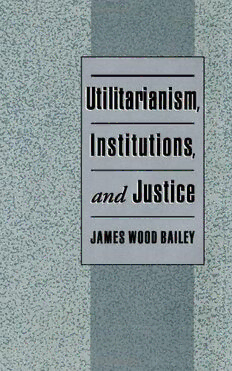Download Utilitarianism, Institutions, and Justice PDF Free - Full Version
Download Utilitarianism, Institutions, and Justice by James Wood Bailey in PDF format completely FREE. No registration required, no payment needed. Get instant access to this valuable resource on PDFdrive.to!
About Utilitarianism, Institutions, and Justice
This compelling book advances utilitarianism as the basis for a viable public philosophy, effectively rebutting the common charge that, as moral doctrine, utilitarian thought permits cruel acts, justifies unfair distribution of wealth, and demands too much of moral agents.James Wood Bailey defends utilitarianism through novel use of game theory insights regarding feasible equilibria and evolutionary stability, elaborating a sophisticated account of institutions that real-world utilitarians would want to foster. If utilitarianism seems in principle to dictate that we make each and every choice such that it leads to the best consequences overall, game theory emphasizes that no choice has consequences in isolation, but only in conjunction with many other choices of other agents. Viewing institutions as equilibria in complex games, Bailey negotiates the paradox of individual responsibilities, arguing that if individuals within institutions have specific responsibilities they cannot get from the principle of utility alone, the utility principle nevertheless holds great value in that it allows us to identify morally desirable institutions. Far from recommending cruel acts, utilitarianism, understood this way, actually runs congruent to our basic moral intuitions.A provocative attempt to support the practical use of utilitarian ethics in a world of conflicting interests and competing moral agents, Bailey's book employs the work of social scientists to tackle problems traditionally given abstract philosophical attention. Vividly illustrating its theory with concrete moral dilemmas and taking seriously our moral common sense, Utilitarianism, Institutions, and Justice is an accessible, groundbreaking work that will richly reward students and scholars of political science, political economy, and philosophy.
Detailed Information
| Author: | James Wood Bailey |
|---|---|
| Publication Year: | 1997 |
| ISBN: | 195105109 |
| Pages: | 215 |
| Language: | English |
| File Size: | 14.06 |
| Format: | |
| Price: | FREE |
Safe & Secure Download - No registration required
Why Choose PDFdrive for Your Free Utilitarianism, Institutions, and Justice Download?
- 100% Free: No hidden fees or subscriptions required for one book every day.
- No Registration: Immediate access is available without creating accounts for one book every day.
- Safe and Secure: Clean downloads without malware or viruses
- Multiple Formats: PDF, MOBI, Mpub,... optimized for all devices
- Educational Resource: Supporting knowledge sharing and learning
Frequently Asked Questions
Is it really free to download Utilitarianism, Institutions, and Justice PDF?
Yes, on https://PDFdrive.to you can download Utilitarianism, Institutions, and Justice by James Wood Bailey completely free. We don't require any payment, subscription, or registration to access this PDF file. For 3 books every day.
How can I read Utilitarianism, Institutions, and Justice on my mobile device?
After downloading Utilitarianism, Institutions, and Justice PDF, you can open it with any PDF reader app on your phone or tablet. We recommend using Adobe Acrobat Reader, Apple Books, or Google Play Books for the best reading experience.
Is this the full version of Utilitarianism, Institutions, and Justice?
Yes, this is the complete PDF version of Utilitarianism, Institutions, and Justice by James Wood Bailey. You will be able to read the entire content as in the printed version without missing any pages.
Is it legal to download Utilitarianism, Institutions, and Justice PDF for free?
https://PDFdrive.to provides links to free educational resources available online. We do not store any files on our servers. Please be aware of copyright laws in your country before downloading.
The materials shared are intended for research, educational, and personal use in accordance with fair use principles.

